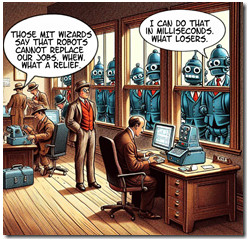Robots, Hard and Soft, Moving Slowly. Very Slooowly. Not to Worry, Humanoids
February 1, 2024
 This essay is the work of a dumb dinobaby. No smart software required.
This essay is the work of a dumb dinobaby. No smart software required.
CNN that bastion of “real” journalism published a surprising story: “We May Not Lose Our Jobs to Robots So Quickly, MIT Study Finds.” Wait, isn’t MIT the outfit which had a tie up with the interesting Jeffrey Epstein? Oh, well.

The robots have learned that they can do humanoid jobs quickly and easily. But the robots are stupid, right? Yes, they are, but the managers looking for cost reductions and workforce reductions are not. Thanks, MSFT Copilot Bing thing. How the security of the MSFT email today?
The story presents as actual factual an MIT-linked study which seems to go against the general drift of smart software, smart machines, and smart investors. The story reports:
new research suggests that the economy isn’t ready for machines to put most humans out of work.
The fresh research finds that the impact of AI on the labor market will likely have a much slower adoption than some had previously feared as the AI revolution continues to dominate headlines. This carries hopeful implications for policymakers currently looking at ways to offset the worst of the labor market impacts linked to the recent rise of AI.
The story adds:
One key finding, for example, is that only about 23% of the wages paid to humans right now for jobs that could potentially be done by AI tools would be cost-effective for employers to replace with machines right now. While this could change over time, the overall findings suggest that job disruption from AI will likely unfurl at a gradual pace.
The intriguing facet of the report and the research itself is that it seems to suggest that the present approach to smart stuff is working just fine, thank you very much. Why speed up or slow down? The “unfurling” is a slow process. No need for these professionals to panic as major firms push forward with a range of hard and soft robots:
- Consulting firms. Has MIT checked out Deloitte’s posture toward smart software and soft robots?
- Law firms. Has MIT talked to any of the Top 20 law firms about their use of smart software?
- Academic researchers. Has MIT talked to any of the graduate students or undergraduates about their use of smart software or soft robots to generate bibliographies, summaries of possibly non-reproducible studies, or books mentioning their professor?
- Policeware vendors. Companies like Babel Street and Recorded Future are putting pedal to the metal with regard to smart software.
My hunch is that MIT is not paying attention to the happy robots at Tesla or the bad actors using software robots to poke through the cyber defenses of numerous outfits.
Does CNN ask questions? Not that I noticed. Plus, MIT appears to want good news PR. I would too if I were known to be pals with certain interesting individuals.
Stephen E Arnold, February 1, 2024


